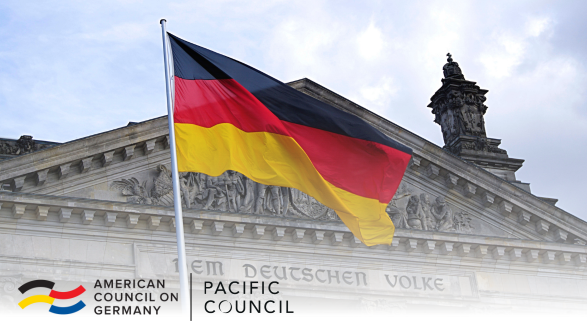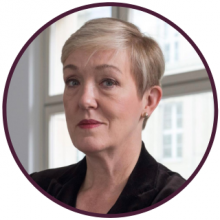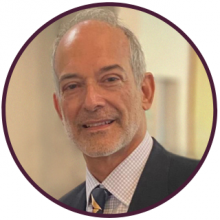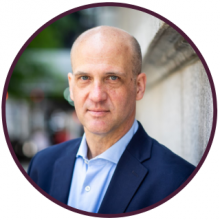Zoom Webinar
As part of the Pacific Council's Global Election Series and in partnership with the American Council on Germany, we are hosting a webinar with Dr. Constanze Stelzenmüller, the Director of the Center on the United States and Europe at Brookings; Peter S. Rashish, the Vice President and Director of the Geoeconomics Program at the American-German Institute at Johns Hopkins University; and Dr. Steven E. Sokol, the President and CEO of the American Council on Germany, to discuss the implications of the German election. This webinar will be held on Wednesday, March 5, at 9 AM PST.
Germany’s election on February 23 is a major political moment with far-reaching consequences for Europe, the United States, and the world. As the country grapples with economic uncertainty, immigration debates, and shifting political alliances, the results will not only reshape Germany’s future but also impact the future of the European Union and NATO.
The Christian Democrats (CDU), a center-right party, won with Friedrich Merz voted to be Germany’s next Chancellor. Merz campaigned on a conservative platform of fiscal and social reforms, including lowering public spending and increased border security. Populist movements continue to gain momentum, with the far-right Alternative for Germany (AfD) growing in popularity and on track to grow their seat total in the Bundestag.
What does this mean for the future of the U.S.-Germany relationship? As longtime allies navigate global security challenges, economic ties, and transatlantic cooperation, a shift in German leadership may bring new tensions or opportunities for collaboration with the new U.S. administration. Our speakers will examine the results of the election, what they mean for Germany, the U.S., and more. There will be time for audience Q&A.
To register for this webinar, visit the Zoom registration page.
Guest Speaker
Dr. Constanze Stelzenmüller is the Director of the Center on the United States and Europe and the inaugural holder of the Fritz Stern Chair on Germany and trans-Atlantic Relations at the Brookings Institution in Washington, DC. A German native herself, she is an expert on German, European, and trans-Atlantic foreign and security policy, as well as international law and human rights. From 2019-2020, Dr. Stelzenmüller held the Kissinger Chair on Foreign Policy and International Relations at the Library of Congress and, from 2014-2019, served as the inaugural Robert Bosch Senior Fellow at the Brookings Institution.
Prior to joining Brookings, she directed the Berlin office of the German Marshall Fund of the United States and later served as Senior Transatlantic Fellow with the organization, heading the Transatlantic Trends Program. Dr. Stelzenmüller’s work in the think tank sphere follows a distinguished career in journalism, including the role of Defense and International Security Editor in the political section of DIE ZEIT from 1994-2005. She has contributed to a variety of publications, writes a monthly column for the Financial Times, and is a frequent commentator on American and European news outlets.
Guest Speaker
Peter S. Rashish is Vice President and Director of the Geoeconomics Program at the American-German Institute at Johns Hopkins University in Washington, DC. He has previously served as Vice President for Europe and Eurasia at the U.S. Chamber of Commerce and as Senior Advisor for Europe at McLarty Associates. He is a member of the Board of Directors of the Jean Monnet Institute in Paris and a Senior Advisor to the European Policy Centre in Brussels. His commentaries have been published in The New York Times, the Financial Times, The Wall Street Journal, Foreign Policy, and The National Interest, and he has appeared on PBS, CNBC, CNN, and NPR. He holds a BA from Harvard College and an MPhil in International Relations from Oxford University.
Moderator
Dr. Steven E. Sokol has been the President and CEO of the American Council on Germany since 2015. Previously, he served as President and CEO of the World Affairs Council of Pittsburgh, and prior to that, he was the Vice President and Director of Programs at the American Council on Germany. Before this, Dr. Sokol served as the Deputy Director of the Aspen Institute Berlin, was the Head of the Project Management Department at the Bonn International Center for Conversion GmbH (BICC), and a Program Officer in the Berlin office of the German Marshall Fund of the United States. Earlier in his career, he also was a Program Manager at the International City/County Management Association (ICMA) and was a paralegal at Fulbright & Jaworski.
He holds a Doctorate in Law and Policy from Northeastern University, an M.A. in International Relations and International Economics from the Johns Hopkins University’s Paul Nitze School of Advanced International Studies (SAIS), and a B.A. from Wesleyan University. He has also studied at the Ruprecht-Karls-Universität in Heidelberg and as a Fulbright Scholar at the Freie Universität in Berlin. Dr. Sokol serves on several non-profit boards and is a member of the Council on Foreign Relations. He was awarded a Bundesverdienstkreuz (Order of Merit) for his work to strengthen German-American relations.







